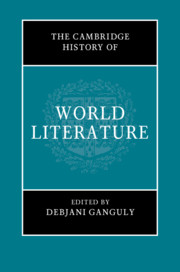Book contents
- The Cambridge History of World Literature
- The Cambridge History of World Literature
- Copyright page
- Contents
- Figures
- Contributors
- Acknowledgements
- Introduction
- Part I Genealogies
- Part II Thinking the World
- Part III Transregional Worlding
- Part IV Cartographic Shifts
- Part V World Literature and Translation
- 27 Translating Iconoclasm: Sino-Muslim Azharites and South-South Translations
- 28 The Avant-Garde Journal between Maghreb and Levant
- 29 The “Forgers” of World Literature: Translation, Nachdichtung, and Hebrew World Poetry
- 30 World Literature as Process and Relation: East Asia’s Russia and Translation
- Part VI Poetics, Genre, Intermediality
- Part VII Scales, Polysystems, Canons
- Part VIII Modes of Reading and Circulation
- Part IX The Worldly and the Planetary
- Index
- References
30 - World Literature as Process and Relation: East Asia’s Russia and Translation
from Part V - World Literature and Translation
Published online by Cambridge University Press: 17 August 2021
- The Cambridge History of World Literature
- The Cambridge History of World Literature
- Copyright page
- Contents
- Figures
- Contributors
- Acknowledgements
- Introduction
- Part I Genealogies
- Part II Thinking the World
- Part III Transregional Worlding
- Part IV Cartographic Shifts
- Part V World Literature and Translation
- 27 Translating Iconoclasm: Sino-Muslim Azharites and South-South Translations
- 28 The Avant-Garde Journal between Maghreb and Levant
- 29 The “Forgers” of World Literature: Translation, Nachdichtung, and Hebrew World Poetry
- 30 World Literature as Process and Relation: East Asia’s Russia and Translation
- Part VI Poetics, Genre, Intermediality
- Part VII Scales, Polysystems, Canons
- Part VIII Modes of Reading and Circulation
- Part IX The Worldly and the Planetary
- Index
- References
Summary
This chapter critically rethinks world literature models through a discussion of Russian and East Asian (Korea, Japan, and China) literary relations and translation-related issues (including the politics of translation, the circulation of texts, and international literary prizes). During the early twentieth century, Russian literature was the most favored among the many foreign literatures that East Asian intellectuals enthusiastically imported. Though we may find many reasons for this, one aspect of Russian literature that is often highlighted in its East Asian context is its social mission. Literature takes on a responsibility beyond its role as an aesthetic product in societies where the state strictly regulates political speech and activity. Incorporating Russia as an explanatory tool for East Asian literatures lets us understand East Asian intellectuals’ shared desire for a socially committed literature that would both critique the present and envision a different future. This shared aspiration does not emerge so readily when we examine the individual relations between Russia and one or another East Asian culture, or when we address East Asian literatures in relation to Western European and American literatures. This aspect of Russian and East Asian literary relations substantially and historically challenges the diffusion model of world literature and the perspective that sees literary works as being embedded in competitive relations among national literatures. Through a discussion of recent world literary theories with a focus on translation, circulation, literary prizes, and ethical approaches to world literature, this chapter argues that we are best served by thinking of world literature not as an entity that operates by inclusion and exclusion or as a single diffusion network defined by hierarchical and competitive relations but as a totality of entangled literary and cultural relations and processes through which new meanings and implications are generated. Rethinking world literature as a new lens, rather than merely as an object to know, also provides new perspectives that allow us to understand the world better through various literatures and their connections.
- Type
- Chapter
- Information
- The Cambridge History of World Literature , pp. 566 - 584Publisher: Cambridge University PressPrint publication year: 2021



